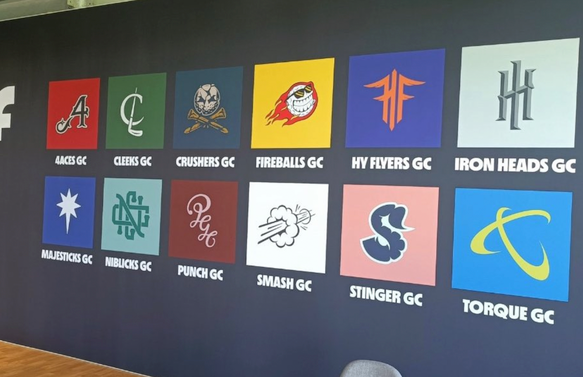
In Jonathan Swift's 1729 essay, "A Modest Proposal," he suggests that -- to solve economic woes of the times -- the poorest people in Ireland should simply sell their children to the rich as food. The parody that LIV Golf has been to date makes Swift's satire look entirely reasonable.
LIV Golf launched on Monday with more player announcements (Phil Mickelson) and continued on Tuesday as Dustin Johnson resigned from the PGA Tour, Talor Gooch claimed he wasn't smart enough to understand sportswashing, and a general circus broke out at LIV Golf's biggest stage to date.
And we haven't even gotten to the part where Mickelson speaks.
Logos and team names dropped for the 48-golfer league, and both look as if they were conceived in an art contest for children of the league's participants. Majesticks, 4Aces, Fireballs and Iron Heads are just a few of the 12 club names, and you can see the team logos below. All the money and most of the time in the world, and this is what we get.
Unfortunately for LIV Golf, it is emblematic of how the last six months have played out.

Despite all of this, the PGA Tour remains vulnerable. Players have intimated that they intend to play the major championships, and if Johnson and Mickelson prove in the months ahead that they're able to contend for history while also moving the comma on their annual compensation, more stars are going to clear the moral hurdle they have set in their own minds (however low it may be) and make the jump.
LIV Golf has problems as well, though. The first is that its demographics are more beer league softball than Cape Cod summer league. At 38, Johnson is one of its youngest stars. And while it certainly has aspirations to draw in some of the top amateurs in the world (like it already has with 2021 U.S. Amateur winner James Piot), the question remains as to whether it can develop its own homegrown stars to take over the PGA Tour as the top league in the world.
Perhaps the folks running LIV Golf don't even care about taking over the PGA Tour, but that does certainly seem to be the desired trajectory. And even if you land the five best amateurs every single year, can those same golfers become stars while shooting 64s into the void at events nobody is watching, or do they need historical context of either a collection of PGA Tour events (Riviera, Muirfield Village and TPC Sawgrass) or the major championships to become the stars Justin Thomas, Collin Morikawa and Jordan Spieth?
That's a complex question with no right answer, but it leads to LIV Golf's single biggest issue: It is making a mockery of itself in the presence of the organizations that probably control its future.
On the same island where, on Tuesday, LIV Golf rolled out comically-named teams captained by folks the average fan has never seen, 50 days from now a golfer will win a 150-year-old jug while hitting shots on a course where folks have struck objects with sticks since before the United States existed.
Rick Gehman, Kyle Porter, Jonathan Coachman and Mark Immelman react to the USGA's decision to allow LIV Golf players to compete in the 2022 U.S. Open. Follow & listen to The First Cut on Apple Podcasts and Spotify.
Those ridiculous teams will play for $25 million later this week while taking a bath for the Saudi Arabia crown prince's future tourism plans, and six weeks later, a town awash in one of the great events in major championship golf will only be thinking about history.
How are both of these entities categorized as professional golf? Has non-major golf ever felt this far removed from the four events that matter most?
If major championships make stars -- and stars are what any league outside the majors is dependent upon -- the obvious logic is that the major championships control the future of professional golf's regular season, so to speak.
How does that take place? Through something called the Official World Golf Rankings, whose founding members include the PGA Tour, R&A, USGA, PGA of America, European Tour, International Federation of PGA Tours and Augusta National Golf Club.
LIV Golf has applied to receive OWGR points, through which its players could maintain statuses as top-50 or top-20 golfers in the world so they can continue to play their way into the majors. LIV Golf COO Atul Kholsa was asked about this idea recently, and he said LIV is "in the process right now of the application to put our application in." Whatever that means.
He also offered a monumental caveat.
"But the [OWGR] board does consist of the same individuals that have threatened players, correct? It's interesting, isn't it, how everything is controlled by the same individuals if you want to play golf in this world? We'll see how it goes."
If the folks running the OWGR don't recognize LIV Golf as a legitimate tour -- a monstrous, sport-shaping "if" at this point -- then LIV Golf will be propped up by D.J. and Lefty in the short term but will struggle to sustain itself in the long-term once those players cycle out of playing in the majors and eventually retire. That's unless its business model is to simply pick off players who have already made a name for themselves and are reaching the end of their careers. (Which it very well might be!).
Ironically, though, by introducing itself as a sideshow to the world -- both behind the scenes, and amazingly, out in public -- LIV Golf has only empowered the major championships to deny it entry into the golf landscape. The majors seem even more important today than they did 3-6 months ago. As "regular season golf" fractures, the majors have never felt more monumental. And with consolidated power comes tremendous influence those organizations can wield over entities like LIV.
The USGA on Tuesday announced that any golfers who have already qualified for the 2022 U.S. Open will be allowed to play at The Country Club next week because it would be unfair to competitors to make a change to their established criteria. However, the USGA clarified that its decision "should not be construed as the USGA supporting an alternative organizing entity, nor supportive of any individual player actions or comments."
The PGA Tour is not impermeable. An organization could come along with a better business model for the modern era and usurp what the Tour has built over the last 50 years. Nobody is denying that.
However, after LIV Golf CEO Greg Norman's amusing-if-they-weren't-so-sad recent comments about Jamaal Khashoggi, and the Saturday Night Live feel to everything LIV has done to date, it's clear this is not that league. If the major organizations get to choose (and it does seem they do), LIV Golf has made the choice spectacularly simple.
Swift's "A Modest Proposal" is positioned as a historically-relevant satirical work that "has come to symbolize any proposition to solve a problem with an effective but outrageous cure."
LIV Golf wouldn't be introduced for another 290 years after Swift wrote his essay, but I'm not sure it has ever been described more accurately or presciently.

















